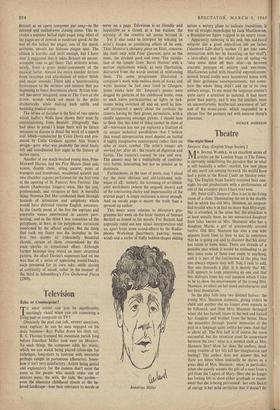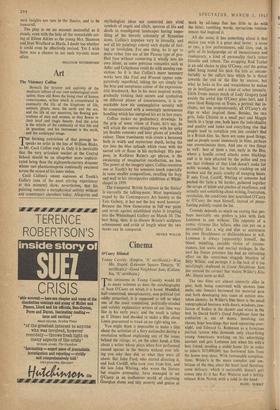Theatre
One-night Stand
Sleepers' Den. (English Stage Society.) MR. IRVING WARDLE, in an excellent series of articles on the London Stage in The Times, is currently underlining the paradox that in what is still basically a sellers' market, few new plays of any merit are coming forward. He would have had a point at the Royal Court on Sunday even- ing. The English Stage Society resumed their one- night try-out productions with a performance of one of the strangest plays I have ever seen.
Mr. Peter Gill's Sleepers' Den is set in the living room of a slum. Dominating the set is the double bed in which lies old Mrs. Shannon, an unspeci- fied invalid who is in fact no more than fifty-eight. She is attended, in the sense that the attendant is at least usually there, by her unmarried daughter Jean (also known as Mrs. Shannon) who has a daughter Maria, a girl of presumably around twelve. Old Mrs. Shannon has also a son who appears from time to time to eat, to announce that he is going out and to discover that his sister has taken to tonic wine. There are strands of a possible plot which it would be misleading to go into since none of them ever come to anything, and it is part of the fascination of the play that one always expects they will. Not, I rush to add, that one demands a plot. It is merely that Mr. Gill appears to keep promising us one and that this distracts from his real purpose which I take to be to show the environment of the young Mrs. Shannon, its effect on her mind and character and her final dissolution.
So the play falls into two distinct halves : the young Mrs. Shannon domestic, giving orders to child and mother she no longer even expects to be followed, and then Mrs. Shannon deranged when she has herself taken to the bed and locked her daughter and brother from the house. Here she meanders through 'poetic' memories of the past in a language quite unlike her own. And that is about all. The first half is of course the more successful, but the intention must lie somewhere between the two : what is a woman such as Mrs. Shannon like? How far does the endless, dead- ening routine of her life kill her imagination and feeling? The author does not answer this but there are times when indirectly he shows us a great deal of Mrs. Shannon : once, in particular, when she quietly accepts the gift of a coat from a girl from the Legion of Mary. Here she no longer has feeling left to show either gratitude or resent- ment that she is being patronised : her only flicker of energy is her mild invitation that it doesn't fit;
such insights are rare in the theatre, and to be treasured.
The play is on no account successful as it stands, even with the help of the remarkable act- ing of Eileen Atkins as the young Mrs. Shannon and Jean Woollard as Maria. I doubt too whether it could even be effectively revised. Yet I wish there was a chance to see such try-outs more often.
MALCOLM RUTHERFORD



































 Previous page
Previous page